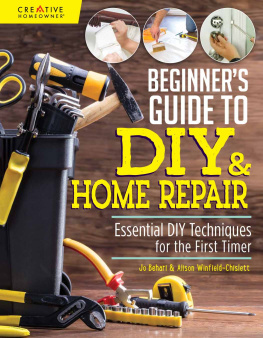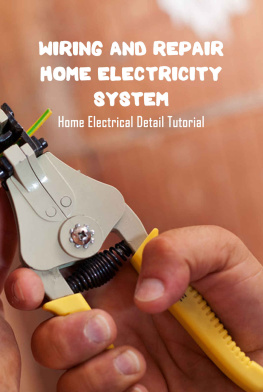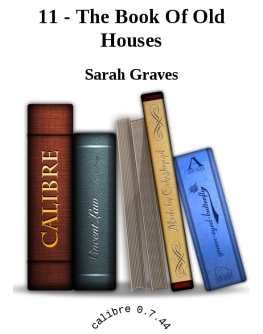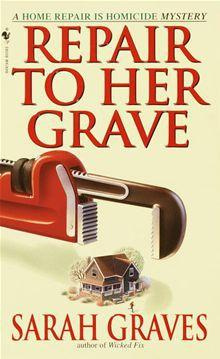 |
| About the Authors |
Al Carrell has been writing the syndicated column Super Handyman for more than three decades. He is also the host of a home repair show that has run in the Dallas/Fort Worth area for fifteen years, currently on KAAM. He cofounded and is regularly featured on Your New House , a nationally syndicated television show that runs in 150 markets. He has also appeared on NBC Today , Good Morning America , Home Matters , and Our Home . He has written seven books on home repair, including the best-selling The Super Handymans Encyclopedia of Home Repair Hints , which was a Popular Science book club selection. He lives in the Dallas area.
Kelly Carrell has been assisting her father in writing the Super Handyman column for fifteen years and is the cohost of the home repair call-in radio show. She has appeared with her father on several television feature spots, including a segment on Your New Home , and has been both a cohost and a guest on several local radio shows. At home, she is the ultimate do-it-yourselfer and is known as the Super Handymom. She lives in the Dallas area.
|  |
| Maintenance 101 |
THE EASIEST FIX-IT PROJECT IS ONE THAT DOESNT HAVE TO BE DONE!
W e know what youre thinking: How can there be a fix-it project that doesnt have to be done? The lesson for today is Maintenance. Properly maintaining the various parts of you home will nearly always extend the life of all those components, as well as make your life a lot easier.
Also, taking care of the small things in time will probably prevent them from becoming big disasters in the not-so-distant future.
MAINTENANCE BY THE CALENDAR
The seasoned homeowner knows that as the season changes, certain things should be done. This chapter gives a rundown on steps to take. In fact, it will be a good idea to have an actual calendar in front of you as you read the text for this lesson. Jot down on that calendar the maintenance steps that apply to your home. When it is time for graduation, youll have your work for the next year already scheduled.
Lets get busy!
SPRING BREAK
Your freshman year of home maintenance could be full of repairs to damage done by Jack Frost. By doing the right things throughout the school year, you will probably be able to do away with many of these steps in future years. Heres your homework:
Take a caulking tour around your house to find any failed caulking. (See page 164.)
Examine concrete items such as walks, drives, and patios to see if Jack Frost has caused damage. (See page 203.)
Get your lawn and garden tools ready to attack the landscape.
Consult your local nursery expert for advice on feeding and irrigating your lawn and garden.
Get or perform a preseason check up on your air conditioning system. (See chapter 17.)
If the cold weather is gone, clean out the fireplace. Move firewood away from the house.
Remove covers from crawl space vents.
It may be a good time to paint the exterior of the house. Just be sure when you paint that theres not a rainstorm around the corner.
Speaking of rain, go outside during the next April shower and check around the perimeter of your home looking for places where water puddles up. (See chapter 7.)
Make certain your gutters are not leaking and that there is no blockage to dam up the flow. Any standing water becomes a breeding ground for mosquitoes.
SUMMER SCHOOL
Here are a few hot maintenance ideas for the good old summertime to help your home play it cool:
Turn off pilot lights for furnaces.
Check the outside air conditioning compressor/ condenser unit to be sure nothing blocks the flow of air across the fins. Look for vines, grass clippings, pet hair, or weeds. Also, bent fins on the outside unit should be combed to straighten them out. More on this in chapter 17.
Get the outdoor grill ready for heating the hot dogs and burning the burgers!
Each month during the cooling season clean, or replace the air conditioning filter.
Check for sweating pipes in the basement or crawl space.
BE A TEACHERS PET!
You can get extra credit for interior painting, and summertime is good for this because you can open windows. Painting is not only good maintenance to keep your home more livable but also can make it more loveable. (See chapter 15.)
AUTUMN
Part of the fall lineup is getting ready for winter, but before we get into that, heres your schedule for the fall semester:
Check the roof for loose shingles, leaks, and flashing woes.
YEAH TEAM! While youre up there, be sure the TV antenna is o.k. so you can catch all thirty-seven football games each weekend.
When you rake up all those autumn leaves, consider starting a compost heap.
Inspect the mortar joints in the fireplace.
Take a look at all doors and windows for any flaws in weather stripping and caulking.
Before heating season, give or have a pro perform an annual checkup to ensure safety and efficiency. Is the ductwork in the attic or basement completely sealed? If not, you can be losing big bucks!
Properly clean and store your lawn and garden tools, with particular attention to the mower and other power tools.
If any outdoor light bulbs are burned out, change them now before its too cold.
TEACHERS TRICK
If you dont like heights, use your binoculars to check the roof!
TEACHERS TIP
Why not put new bulbs in all outdoor sockets? Sure beats doing it on the coldest day of the year.
WINTER
Here are steps that will make you and your family feel warm all over:
Protect all outside hydrants against freezing. See Freeze Protection in chapter 4.
Bring in houseplants that might die from frostbite.
Clean the heating systems thermostat. (See page 145.)
Make sure the home has ample humidity so furniture doesnt dry out and crack. Proper humidity also makes us humans feel warmer.
A BIOLOGY LESSON
Often when plants are brought inside, therell be a lizard or a bug hidden in the pot. This is a surprise you may not want, so look for the pests before you move em in.
NOT SEASONAL BUT VITAL
Here are some things you should do every year:
Trip each circuit breaker switch manually and then push it back to the ON position. (See page 35 for details.)
Replace the batteries in your smoke alarm twice a year. The same day we change our clocks for daylight savings time makes it easier to remember.
Run a gallon of vinegar through the short wash cycle of your automatic dishwasher. This rids the appliance of minerals from water.
The same goes for the clothes washer.
Drain the water heater tank. (See page 122.) Once a year is about right for most homes, but if you have very hard water it may require draining more often.
NOW, IF YOU CAN ONLY REMEMBER WHERE YOU KEEP THE CALENDAR!
|  |
| Tools 101 |
TOOL ADAGES FROM THE OLD SCHOOL!
A workman is only as good as his tools!
A novice with the right tool can achieve success while a pro with the wrong tool may fail.
O ur basic list of tools is not very long. It is intended to let you be prepared for the everyday disasters that can happen around the house and usually do. These supplies that you buy for the freshman year can last through graduation and beyond, IF you buy quality tools and IF you take proper care of them. Quality tools also perform better. Often the price difference between a good tool and a cheapie is only a matter of pennies. Weve known of some tools from the bargain bin to not even last through the first project.










